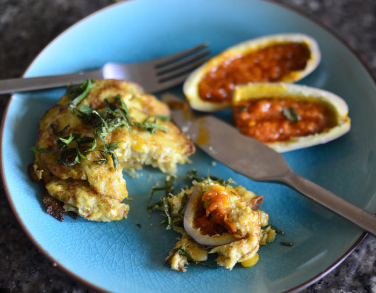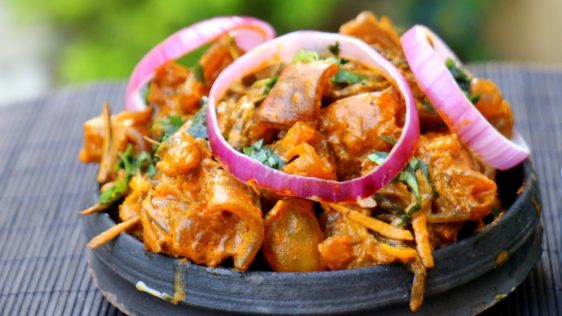Good food is very often, even most often, simple food.”
The soul to our culture is tucked in between spices and the delicacy of the local kitchen. These Traditional cuisines, like many oral traditions, have been passed from one generation to another with food practices often memorised and hardly documented. The recipe of the people is a reflection of their history. The enormously populated Nigeria is extravagantly multicultural, and in this diversity lies a unique aspect-food!
Let’s dive into the rare culinary of some Nigeria cultures; our lives could just be a combination of magic and good food.
Ekpalana
From the urban street of Yenogoa to the hidden creeks of Oloibiri where oil was discovered first, there is a food that unites the Ijaw people of Bayelsa. Ekpalana! An upgrade of Kekefia (another popular southern dish) is used for special occasions. Plantain in whatever form is useful; ripe, unripe, or overripe, plantain would always serve the right purpose with its endless culinary expressions.
First, you chop unripe plantain into tiny bits or cubes, put it on fire to boil with just enough water. Next, you cut off a whole plantain leaf and pass it over the fire to slightly wilt slowly. This creates a coat on the leaf, that way it doesn’t tear off easily. Add some fish or meat or snail already garnished with grounded crayfish and Uziza seed, spices and placed inside the plantain leaves. This is wrapped up and tied carefully with palm fronds. Once done, you cook in a pot along with your plantain till soft. This process gives the plantain porridge a distinct flavour. The liquid paste produced from the porridge is then separated as soup that will be eaten along with the porridge and some palm oil.
Adun or Aadun
Adun is a very simple snack among the Okun people of Kogi state, a group of Yoruba dialect-speaking communities in North-central Nigeria. Unlike the typical peppered corn meal familiar with the Yoruba people, also called Adun, the Okun people have a unique way of making theirs. You roast the cornmeal to brown and grind it into powder form adding grounded pepper, then you fry the beans separately till it foams of oil, after which you mix with your cornmeal and wrap into banana leaves. Adun can last up to a year when stored properly.

Aniga
An ancient food of the Oko people of Anambra, Aniga is prepared from water yam and cocoyam. The water yam and cocoyam are peeled with every single piece grated into a mortal and stirred hard using a pestle thoroughly. Wash and squeeze bitter leaves (Onugbu) with salt then add to the yam and cocoyam paste. Leaves from plantain are cut and exposed to mild fire for it to wilt.
Each portion of the paste is carefully spread on the leaves and wrapped with stems of palm fronds. Place each wrap into a pot and allowing it to boil for a long time until it is soft for consumption. The final process is making the sauce, which is a mix of red oil, African nutmeg, spice and hot water. Pour the sauce into the cooked food and allow to simmer for consumption.
Margi Special
The Margi people are located along the Mandara Mountains in Adamawa and spread towards Cameroon and Chad. The indigenous Margi special is a typical food if you travel far northeast, Nigeria.
Zobo leaves (dried Roselle plant flowers) are soaked in hot water and left overnight to ferment. Slice your catfish together with tomatoes, peppers, green vegetables and onions into a bowl. Seasoned to your taste, boil in the zobo water as you gradually add oil and leave it to cook till it is done. The fish sauce goes well together with Tuwo Shinkafa.

Sapala
What happens when you replace the beans in Moin-Moin with corn? You get Sapala. This is a typical Ijebu food that is easily made from fresh corn. Stock the cobs to get your sweet corn, then with a combination of ingredients such as chilly pepper, sliced onions, crayfish and salt to taste, you grind in a blender till you have your creamy corn. Scoop it with a spoon into a wrap which can be Moin-Moin leaves, tins, or aluminium foils and cook till it gets done.

S’agba Rigidi
This translate to “make the elderly strong”. This is a “heavy” diet which once you’re done eating, you only crave for water and more water. This is prepared by the riverine Awori people of Lagos. Unlike the way Eba (garri) is made with hot water, S’agba rigidi is prepared with the water used in boiling crabs. After making the Eba, onions, salt and chilly pepper are added and stirred together. The crab’s shell is opened, and the morsels of Eba are dipped into it.



